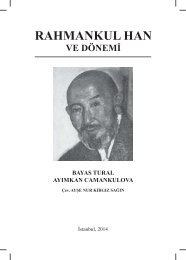THE SOVIET HISTORIOGRAPHY AND THE QUESTION OF KAZAKHSTAN’S HISTORY
SOVYET-TARIH-YAZICILIGI-ENG
SOVYET-TARIH-YAZICILIGI-ENG
You also want an ePaper? Increase the reach of your titles
YUMPU automatically turns print PDFs into web optimized ePapers that Google loves.
162<br />
<strong>THE</strong> <strong>SOVIET</strong> <strong>HISTORIOGRAPHY</strong> <strong>AND</strong><br />
until the end of the 1950s.<br />
Because 1960s were the years when the type of Soviet historian<br />
was fully formed, it is beneficial to take this issue broadly. The era<br />
of 1960s was the time when the Soviet historian was under the influence<br />
of Soviet ideology; he submitted himself to this ideology. The<br />
place for the open declaration of this submission was at the Public<br />
Agreement on Precautions for the improvement of preparing Scientific-Pedagogy<br />
Personnel for History organized in Moscow between 18<br />
and 21 December 1962. The meeting was attended by almost 2000<br />
historians, scientists, lecturers, and archivists from different regions<br />
of the Soviet Union. On December 18 and 19, a general session occurred<br />
in which the academic B. N. Ponamaryev—who attended the<br />
meeting as the representative of the State—gave a speech about “The<br />
duty of History as Science and the Preparation of Scientific-Pedagogy<br />
Personnel for History” that was discussed. On December 20-21 the<br />
issues of History of CPSU, History of USSR, and General History were<br />
discussed in three sessions. As the “translator”, President of USSR<br />
Sciences Academy, M. V. Keldış, narrated the duties that Ponamaryev,<br />
as the representative of state, placed on historians:<br />
“In the program of Communist Party of Soviet Union, social sciences<br />
and fine arts play the main role in the guidance to social development.<br />
In the establishment of communism, these examine socialism and its<br />
transmission to communism in political, economic and cultural levels,<br />
develop and strengthen the idea of communism in Soviet society.<br />
Science of history has a specific place in fulfilling these duties. It<br />
is important to learn the recent history of our country and to examine<br />
the successful history of Communist Party and Soviet society, and<br />
also Socialism, Communism and the labor movements in the world”. 275<br />
As a consequence of these efforts, Soviet historians crafted the<br />
“submission letter” below, on the last day of the meeting, and with<br />
the guidance of the CPSU:<br />
“To Central Committee of Communist Party of Soviet Union,<br />
We, the meeting contributors of Soviet Union historians, thank to<br />
Central Committee of Communist Party of Soviet Union under the leadership<br />
of Nikita Sergeyevich Khrushchev, on behalf of many important<br />
scholars for the development of science of history in our country. The<br />
CPSU Program and the decisions of XXII Party Congress gives the duty<br />
журнaлa Отечественнaя история С. В. Тютюкиным”, Отечественнaя история,<br />
Московa 2001. No. 5, pp. 128-130.<br />
275 КелдыШ, М. В., “Вступительное слово”, Все союзное совещaние о мерaх улучwения<br />
подготовки нaучно-педaгогических кaдров по историческим нaукaм,Москвa, 18-21<br />
дек. 1962г., Moscow, 1964. pp. 9.



